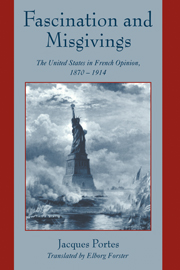Book contents
- Frontmatter
- Contents
- Preface
- Introduction
- Part I The United States as Exoticism
- Part II Models from the United States
- 6 A Truly American Democracy
- 7 A Political Life without Grandeur
- 8 The New World of Education
- 9 La Belle Américaine
- 10 From the Mormons to Americanism
- 11 Social Hell or Social Harmony?
- Part III The United States as Power
- Conclusion
- Selective Bibliography
- Index
9 - La Belle Américaine
Published online by Cambridge University Press: 07 October 2009
- Frontmatter
- Contents
- Preface
- Introduction
- Part I The United States as Exoticism
- Part II Models from the United States
- 6 A Truly American Democracy
- 7 A Political Life without Grandeur
- 8 The New World of Education
- 9 La Belle Américaine
- 10 From the Mormons to Americanism
- 11 Social Hell or Social Harmony?
- Part III The United States as Power
- Conclusion
- Selective Bibliography
- Index
Summary
The fascination American women held for the eyes and minds of the French, indeed all Europeans, was of long standing. It can already be seen among the first observers of the society of the New World, from François-Jean de Chastellux to the great Tocqueville himself. They marveled at the high spirits of young girls, at their poise in every situation, at “the extreme liberty that prevails in this country between persons of different sex before they are married,” and at the resolute bearing that matrons kept up even in the lonely Western pioneer life of those days. This fascination did not fade over the years, and by the beginning of the nineteenth century one regularly finds positive comments on the freedom enjoyed by American women, the near-absence of constraint and discrimination they encountered, and on the role they played in politics.
The continuity of this admiration, which did not preclude certain criticisms, is all the more astonishing because throughout these periods a very different tune was heard in the United States: Women protested against the inequality to which they were subjected, and some of them struggled vigorously to end it, albeit with only partial success. This gap between reality and the image constructed by the French can be explained, however, by the real discrepancy that existed in this domain between Europe and the New World.
Between 1870 and 1914, these views could have changed. American women were able to establish a certain equality in many areas of public life – except the right to vote in national elections – and to make it stick, but French women were not idle either, succeeding over the years in breaking some of the locks of their society’s ironclad traditionalism.
- Type
- Chapter
- Information
- Fascination and MisgivingsThe United States in French Opinion, 1870–1914, pp. 254 - 282Publisher: Cambridge University PressPrint publication year: 2000

